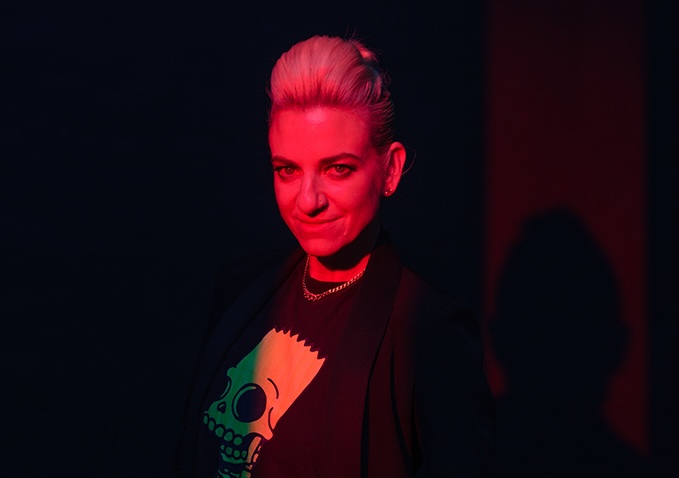‘Human Museum’ Puts the Bots in Charge (Review)
Rorschach’s thought-provoking trip to "Human Museum" plays a chilling sci-fi premise primarily for laughs.

Consistent with Rorschach Theatre’s adventurously immersive productions, the company’s latest, Human Museum by Miyoko Conley, engages audiences in playful conversation with its themes well before the show even begins.
Audiences enter through the titular museum, a hallowed institution operated by robots of Earth in a future where humans are extinct. Created inside the same two-story Connecticut Avenue former retail space where, last fall, Rorschach unleashed Night of the Living Dead Live, the Human Museum passes patrons through galleries filled with artifacts of human existence.
Considering this is the work of artificially intelligent bots with only a secondhand concept of what humans were like, the exhibit items have been well chosen.
Doubtless, future minds, be they artificial or alien, may well be fascinated to understand what Twinkies were, and why humans consumed so many of them. The human fascination with mirrors, though less mysterious, also seems a good call for a cultural footnote that AI would deem museum-worthy.
Making the calls for this production, Rorschach co-artistic director Randy Baker stages Miyoko’s post-apocalyptic sci-fi downstairs on the museum’s lower level, in a traverse configuration placing the audience on either side of the action.
Set designer Gavin Mosier has suspended, like a canopy over the oblong stage, a chaotic tangle of string lights and A/V cables, complemented by video projection screens at both ends. This area of the museum is currently closed for installations.
Other human items on display, like a chess set and an old VHS player, fill the room, along with clocks and timers. We’re counting down the end of days inside the so-called Time Room of the Human Museum, where bots 237 (Rebecca Husk) and 65 (Aron Spellane) are prepping an exhibit commemorating 100 years of human extinction.
Homo sapiens being done and dusted for a century could be a starkly despairing starting-off point, but the play generally has fun with the concept, in the beginning. Bot 237, in charge of physical artifacts at the museum, has, accordingly, developed an almost human-like attachment to humans’ stuff and their lives. She sees beauty in human frailty.
Husk lends the bot a cheery curiosity, too, as 237 attempts learning to laugh, watching some human’s birthday home movies on an old tape player she’s named “Bob.” Conversely, Bot 65, who sorts and stores data, goes about their tasks with a distinct lack of good humor, rendered by Spellane with bone-dry sarcasm.
Both bots are managed by Director Bot, a bigger character in terms of personality, portrayed with verve by Ixchel, though the performance is not as persuasive in its uncanny un-humanness.
The entire cast of robots, including Ayanna Fowler’s amusingly chipper Delivery Bot, are aided only somewhat by wardrobe in casting the illusion of artificial life. In general, the hair, makeup, and costume concepts don’t have the same evocative effect as the environment, props, lighting, sound, and video design.
Those atmospheric elements create space for connecting to the play’s offbeat takes on a bleak, post-human world, like the very funny exhibit dedicated to disaster movies that came true. Hello, Waterworld.
The play also locates a ray of hope within the disastrous circumstances that preceded humans’ demise. The bots at the museum make contact over two-way radio with someone named Avery (Bri Houtman), who claims to be a passenger on the Eternal Cruise, the space vessel that served as humanity’s last chance for survival.
Baker — who too often sends the action ping-ponging between opposite ends of the stage — perches Avery close by for her cosmic long-distance calls. The performers’ physical closeness belies the unfathomable distance between a room full of robots and, possibly, the last human alive.
That is, the last human except for the Scientist (Jennifer Knight), who runs the bots that run the museum. Strangely, the play does not engender much interest in her, but rather pursues the more intriguing mystery behind Avery’s identity, prompting poignant questions about the legacy humankind might leave of its time here on Earth.
Human Museum (★★★☆☆) runs through May 5 at 1020 Connecticut Ave. NW. Tickets are $20 to $50. Call 202-399-7993, or visit www.rorschachtheatre.com.
Support Metro Weekly’s Journalism
These are challenging times for news organizations. And yet it’s crucial we stay active and provide vital resources and information to both our local readers and the world. So won’t you please take a moment and consider supporting Metro Weekly with a membership? For as little as $5 a month, you can help ensure Metro Weekly magazine and MetroWeekly.com remain free, viable resources as we provide the best, most diverse, culturally-resonant LGBTQ coverage in both the D.C. region and around the world. Memberships come with exclusive perks and discounts, your own personal digital delivery of each week’s magazine (and an archive), access to our Member's Lounge when it launches this fall, and exclusive members-only items like Metro Weekly Membership Mugs and Tote Bags! Check out all our membership levels here and please join us today!



























You must be logged in to post a comment.